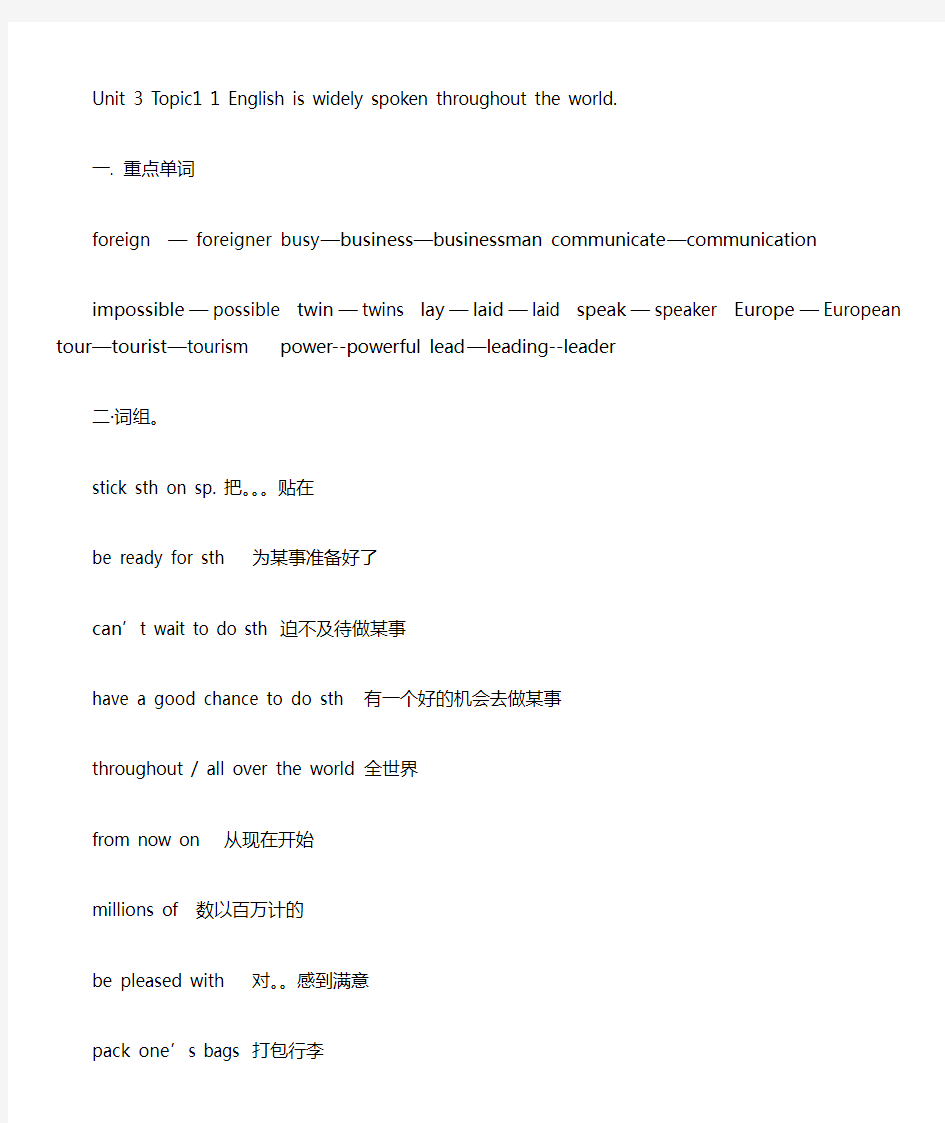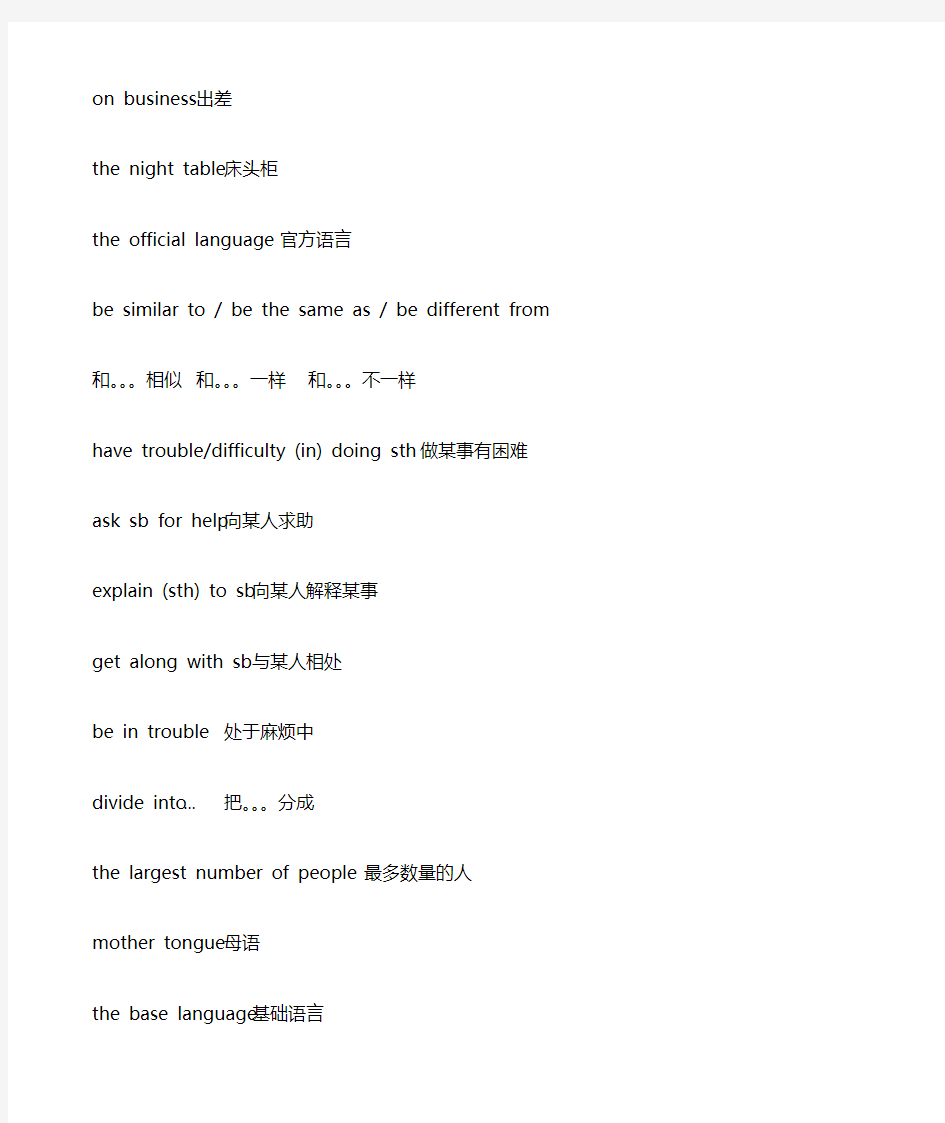初中英语牛津译林版七年级英语上册知识点第三单元


Unit 3 Topic1 1 English is widely spoken throughout the world.
一. 重点单词
foreign —foreigner busy—business—businessman communicate—communication
impossible—possible twin—twins lay—laid—laid speak—speaker Europe—European tour—tourist—tourism power--powerful lead—leading--leader
二·词组。
stick sth on sp. 把。。。贴在
be ready for sth 为某事准备好了
can’t wait to do sth 迫不及待做某事
have a good chance to do sth 有一个好的机会去做某事
throughout / all over the world 全世界
from now on 从现在开始
millions of 数以百万计的
be pleased with 对。。感到满意
pack one’s bags 打包行李
on business 出差
the night table 床头柜
the official language 官方语言
be similar to / be the same as / be different from
和。。。相似和。。。一样和。。。不一样
have trouble/difficulty (in) doing sth 做某事有困难
ask sb for help 向某人求助
explain (sth) to sb 向某人解释某事
get along with sb 与某人相处
be in trouble 处于麻烦中
divide into…把。。。分成
the largest number of people 最多数量的人
mother tongue 母语
the base language 基础语言
international business 国际商业
the world’s airlines 国际航空
in many different fields of life 在生活的很多不同领域
go abroad 出国
play an important part in our lives 在我们生活中扮演重要角色
a powerful country 一个强大的国家
take the leading position in 在某方面处于领先地位
encourage sb to do sth 鼓励某人做某事
be popular with sb. 受某人的欢迎
make great progress in doing sth 在某事上取得巨大的进步
require sb to do sth 要求某人做某事
in the rest of 在。。。的剩余部分
regard…as…把。。。当做。。。
三.重点句子。
1.I will be able to see more cartoon characters。我将能够去看更多的卡通人物。
2.I can’t wait to fly there. 我迫不及待想飞去那里。
3.You’ll have a good chance to practice your English there. 你将有一个好机会去练习你的英语。
4.Try your best and work much harder from now on. 尽你所能从现在开始更加努力的学习。
5.Is it possible for you to have trouble communicating? 你有可能在交流上有困难吗?
6.I don’t think I will have any long conversations in Spanish.
我认为我将不会用西班牙语进行长对话。
7.I wish you success. 我祝你成功
8.There are more than 3000 languages spoken in the world. 全世界有超过3
千种语言被使用
9.Disneyland is enjoyed by millions of people from all over the world.
世界上数以百万的人们都喜欢迪斯尼乐园。
10.English is spoken as the main language in America. 英语在美国作为第一
语言来说。
11.English is widely used throughout the world now. 英语在全世界被广泛使用。
12.Now, students are required to learn English. 现在学生们被要求学习英语。
13.The study of English is regarded as a very important industry in China as well as in the rest of the world. 英语的学习在中国和世界的其他国家都被当做一个非常重要的产业。
四.语法
英语动词有两种语态.,主动语态和被动语态。
主动语态表示主语是动作的执行者,被动语态表示主语是动作的承受者。如:
They will build a new bridge over the river. (主动) A new bridge will be built over the river. (被动)
汉语中常用“被”、“给”、“由”、“受”等词用来表示被动,而英语用:助动词be + 及物动词的过去分词构成+(by+ 动作的执行者)。be 有人称,数和时态的变化,其肯定式,否定式和疑问式的变化规则与be 作为系动词时完全一样。如:
English is widely used around the world English is not widely used around the world.
Is English widely used around the world? Yes, it is. No, it isn’t.
被动语态的构成为“be + 过去分词”。在不同的时态中,过去分词保持不变,而be 动词随着时态有不同的变化,如:am/ is/ are(一般现在时);was/ were (一般过去时);have/ has been( 现在完成时);am/ is/are being (现在进行时)等。若含有情态动词,则用“情态动词+ be + 过去分词”结构。
The flowers are being watered by them. 他们正在浇花。The plan has been found by me. 钢笔已经被我找到了。Homework must be finished first. 必须要先完成作业。练习题
()1._____ a new library in our school last year?
A. Is; built
B. Was; built
C. Does; build
D. Did ; build ( )2. An accident on this road last week.
A. has been happened
B. was happened
C. is happened
D. happened
( )3.Cotton(棉花) in the southeast of China.
A. is grown
B. are grown
C. grows
D. grow ( )4.So far, the moon by man already.
A. is visited
B. will be visited
C. has been visited
D. was visited ( )5.A talk on Chinese history in the school hall next week.
A. is given
B. has been given
C. will be given
D. gives ( )6.--When ___ this kind of computers______? --Last year.
A. did; use
B. was; used
C. is; used
D. are; used
Unit 3 Topic2 Some things usually have different meanings in different cultures.
归纳:任若冰老师
一. 重点词组归纳
see sb. off 为某人送行
on one’s way to…在某人去。。。的路上put out his hand with his thumb raised 竖起拇指伸出他的手ask for a ride 请求搭便车
give sb. a ride 让某人搭便车
get on (the bus) 上车
pick sb. up 开车接某人
in several minutes 在几分钟之内/之后
give sb. a speech 给某人做个演讲
as a sign of…作为。。。的标志/表示。。。
a dog catching a mouse 狗捉耗子多管闲事
be known/famous as…作为。。。而著名
be known/famous for…因。。。而著名
be known to sb. 被。。。所熟知
even if 即使
do some research 做些调查研究
stamp one’s foot 跺脚
have a victory 取得胜利
hold hands 握手
avoid doing sth. 避免做某事
be considered as…= be regarded as…被看作。。。
be considered (to be)…被认为。。。
at times 有时
compare A to B 把A 比作B
compare A with B 把A 和B 做比较
pay attention to…注意。。。
in the past few centuries 在过去的几个世纪里
even worse 更糟糕
write back to sb. 给某人回信
二. 重点句型
I can’t believe that I’m flying to Disneyland.
我都不敢相信我就要飞往迪斯尼乐园。
Michael sees a stranger putting out his hand with his thumb raised. Michael 看到一个陌生人正竖起拇指地伸出他的手。
with his thumb raised with 结构作伴随状语
Eg. The teacher came in with a cup in his hand.
The thief stood there with his arms tied behind his back.
My uncle is meeting us tomorrow.
我的叔叔明天要来接我们。
No need to worry. = There is no need to worry.
没有必要担心。
I hope I won’t have much difficulty in communication/communicating.
我希望我在沟通上不会有很多困难。
Whenever you need help, send me an e-mail or call me.
无论什么时候你需要帮助,请给我发电子邮件或打电话给我。
这是由连词whenever 引导的让步状语从句,在这样的句型中Whenever = no matter
when 无论什
么时候,相似的用法还有:
wherever = no matter where 无论在哪儿however = no matter how 无论怎样whoever = no matter who 无论是谁whatever = no matter what 无论什么
We use body language to communicate how we feel, even if there is silence.
我们使用肢体语言来表达我们的感受,即使没有声音。
Then I know whether she will praise or punish us.
然后我就知道她是要表扬我们还是要惩罚我们。
I wonder if/whether body language means the same thing in all cultures.
我琢磨着肢体语言在所有文化中表达相同的意思。
The ancient emperors compared themselves to dragons.
古代的帝王们把他们自己比作龙。
Every dog has its day.
人人都会有得意的时候。
You are a lucky dog. 你真是个幸运儿
It is possible to tell whether a person is American or British by listening to his or her speech.
通过听他或她的说话来判断一个人是美国人还是英国人是有可能的。
The English language has also changed by borrowing words from other languages.
英语这门语言还通过从其他的语言借用单词而发生变化。三. 语法复习:
现在进行时表将来。
现在进行时表将来时常用“意图”“安排”或“打算”的含义。这种现在进行时比较生动,给人一种期待感。1.现在进行时态表将要发生的动作,多用于一些位移动词,如:arrive, come, get, go, have, leave, meet, play, return, see, start, stay .
(1)I’m going. 我要走了。
(2)I'm coming.我要来了。
(3)When are you starting? 你什么时候动身?
2.表将来的现在进行时除用于位移动词外,亦可用于某些非位移动词。如:
(1)I’m meeting you after class. 课后我找你。
(2)What are you doing next Sunday? 下星期你打算干什么?
(3)She is buying a new bike soon. 她不久将买一辆新自行车。
3.但偶尔也表示较远的将来。如:
When I grow up, I’m joining the army. 我长大了要参军。
Unit 3 Topic3 Could you give us some advice on how to learn English well?
一、重点词汇词形变换
1. wonder (v.)—wonder( n).—wonderful (adj.)
2. advice (n.)–advise (v.)
3. sleep (v.)—sleepy (adj.)
4. courage (n.)—discourage (v.)
5. able (adj.)—ability (n.)
6. pronounce (v.)—pronunciation (n.)
7. discuss (v.)—discussion (n.) 8. effect (n.)—effective (adj.)
9. breath (n.)—breathe (v.) 10. real (adj.)—really (adv.)
重点词组
places of interest 名胜古迹
make oneself understood别人能听懂你的话
get into trouble 陷入麻烦中
be in trouble 处于麻烦中
work hard at…努力学习。。。
feel sleepy 犯困
fall asleep 入睡
be asleep 睡着的
be afraid of (doing) sth 害怕(做)某事
be afraid to do sth 害怕,不敢去做某事
be afraid that 从句恐怕.....
make (rapid/great) progress 取得(快速地/很大地)进步
give up sth/doing sth 放弃某物/做某事
at times=sometimes =once in a while 有时,偶尔
feel like doing sth 想要做某事
be good at sth = do well in 在某方面很擅长
be weak in sth 在某方面很薄弱
keep a diary in English (坚持)用英语写日记
take part in the English Corner 参加英语角
join the English club 参加英语俱乐部
give sb. some advice on/about... 给某人一些有关的建议
turn to sb. = ask sb. for help 向某人求助
dare not do sth (用法和need 类似) 不敢做某事
dare to do sth 敢于做某事
improve my reading ability 提高我的阅读能力
do more reading 多阅读
think about …考虑。。。
make mistakes 犯错误
take a deep breath 深呼吸
have a try= give it a try 试一试
advise sb to do sth 建议某人做某事hold/have a class / sports meeting 开班会/举行运动会the results of the discussion 讨论的结果
share sth with sb 和某人分享某物
It’s an honor/my honor to do sth 做某事感到荣幸
preview the day’s lesson before class 课前预习当天的功课
as often as possible 尽可能经常
Good job! 干得好!
one or more of them 他们中的一个或更多个
remember to do sth 记得去做某事( 还没做) remember doing sth 记得做过某事(已做过)
as long as…只要。。。
have/get…ready 把。。。准备好
in this way 用这个办法
stick to (doing)sth. 坚持(做)某事.....
二重点句型
1.Could you make yourself understood in the U.S.A?
在美国,别人能懂得你的话吗?
2.I don’t know what to do.我不知道该怎么办?
3.At times I feel like giving up.有时我想要放弃。
Although he was seriously ill, he didn’t give up smoking.
5.I dare not answer questions in class, because I’m afraid of making mistakes.
我不敢在课堂上回答问题,困为我害怕犯错误。
How dare you speak to me like that? 你怎敢像那样地和我说话?在以上两句中,dare 是情态动词。
dare 还能当行为动词,如:He didn’t dare to say anything in the meeting.
6.It’s an honor to talk with all of you.与在座的各位交谈是我的荣幸。
7.It seems that I haven’t made any progress. 似乎我没有取得任何的进步。
8.I’m sure that you will make great progress as long as you stick to them.
我相信只要你坚持,你将取得很大的进步。
as long as 意为“只要”, 引导条件状语从句。
eg. We’ll go as long as the weather is fine.
9.He is wondering whether to go to the party. 他不知道是否要去参加聚会。这里“是否”,不可以用if , 因为if 不能接不定式。
10.How to improve English was my biggest problem.
如何提高英语是我最大的问题。
三语法学习
wh- +to do
wh-是指when, where, which, who(m)及how 等连接词,它们和动词不定式连用,即为wh- +to do 结构。这种结构在句中常作主语、表语和宾语,作宾语时可以转换为宾语从句。(对于谓语动词来说,wh- +to do 这个不定式动词的动作是个尚未发生的动作,所以在转换成宾语从句时,通常须加情态动词或用将来时表示未来。)
如:I don’t know what to do.=I don’t know what I should do.
She can’t decide which to buy.=she can’t decide which she should buy.
反之,如果主句中的主语与宾语从句中的主语一致时,宾语从句(由疑问词引导)通常可以与“疑问词+不定式”互相转换。
如:I don’t know what I should do.=I don’t know what to do.
如果不一致就不能转换。I want to know what Mary will do.(不能说:I want to know what
to do.)
